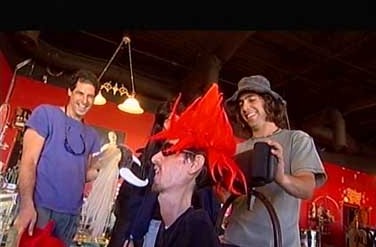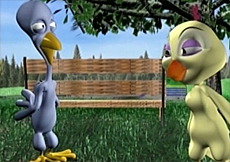39 Pounds of Love


Ami Ankilewitz was diagnosed with a rare form of muscular dystrophy when he was born. The doctor told his mother he had six years to live. Against all odds, Ankilewitz survived. And grew. And grew. In a nice simple introduction, director Dani Menkin shows the passage of time with some text. Today, Ankilewitz is 34 and weighs only 39 pounds. He is nearly paralyzed except for one finger. 39 Pounds of Love is a documentary about Ankilewitz, his desire to seek out the doctor that gave his mother the incorrect life expectancy, and his desire to ride a motorcycle. The last item was nearly impossible given how frail his body was.
The most striking thing about Ankilewitz is how normal he is. Aside from his disability, he is like any other guy. He likes to drink. He has a sharp wit. He works as a computer animator, making CGI cartoons. He also has a huge crush on his caretaker, a lovely young woman from Romania. Sadly, she does not share his feelings, and it does create a pretty poignant situation. Ankilewitz has a zest for life, and a circle of good friends. He is able to live and enjoy life despite the stares he gets from onlookers, captured deftly by Menkin.
Part of what makes him ordinary also makes the tone of the documentary a bit distasteful. It is heartening to watch him make the journey to the United States. It is not watching him yell "Cordova! Doctor Cordova!" endlessly with his friends and the film crew. For most of the film, it's not quite clear what he's going to say to his doctor, but what is clear is that it's a bit more than "I just wanted to show you I'm alive and I'm glad you're wrong." Ankilewitz is understandably angry, but his feelings add a bitter tone to a movie that should not have one. He should be proud of his accomplishments, and simply ignore something that happened over three decades ago.
Menkin, who co-wrote the screenplay with Ilan Heitner (Bagel Wisdom) and they stick to the conventional. Emotional highs and lows, including an unexpected reunion and a dangerous trip to the Grand Canyon, are blunted by continual references to the doctor. The music does get pretty intrusive and sappy, which is completely unnecessary. The same applies to the use of Ankilewitz's animation, and a few desert conversations with Americans. Menkin keeps trying to make things more emotional, not realizing that he doesn't need to do so at all.